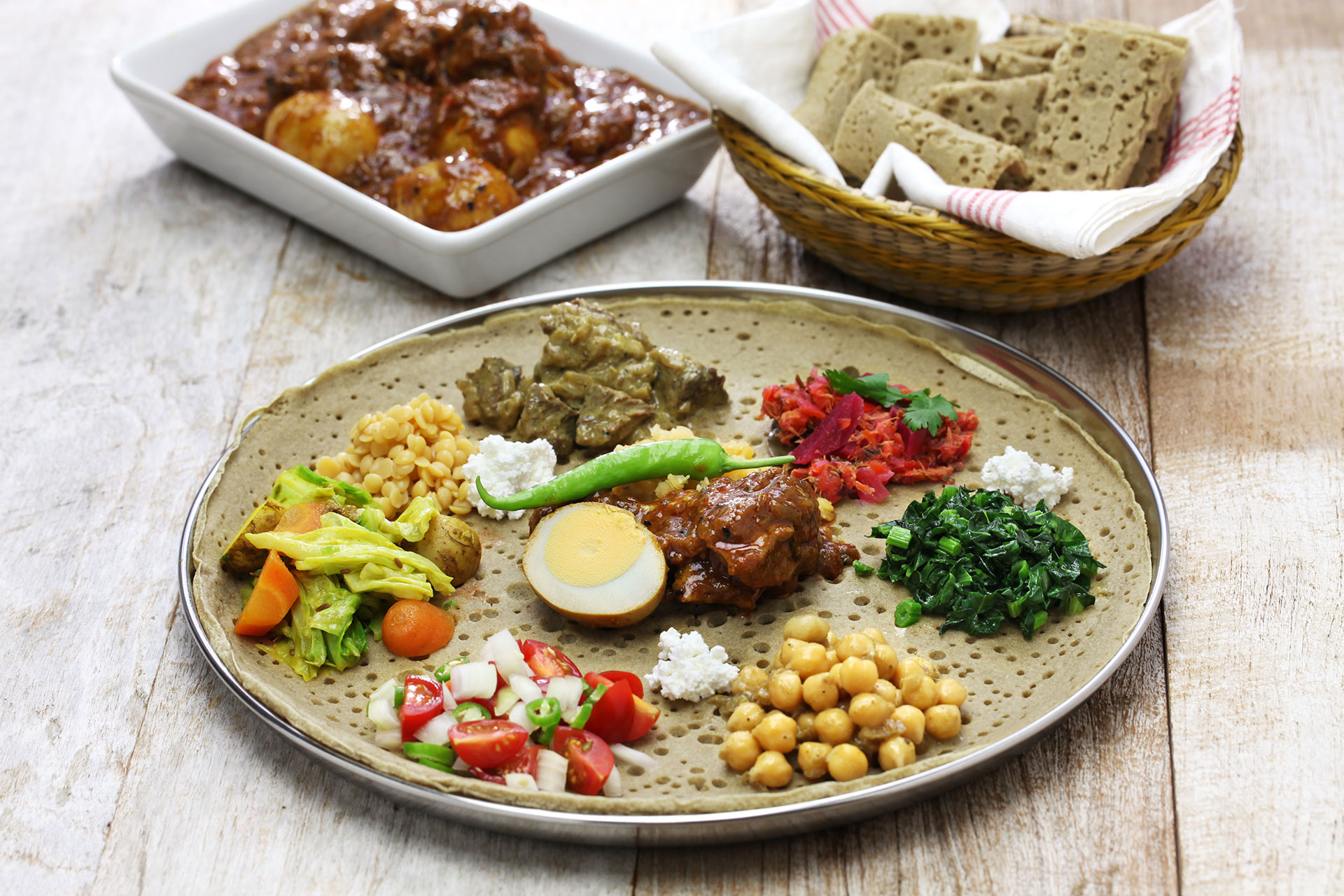
Is Ethiopian Food Healthy
Introduction
Ethiopian cuisine, deeply rooted in a rich historical tapestry and cultural significance, is more than just an exotic culinary experience; it’s a treasure trove of health benefits. Is ethiopian food healthy?This blog post aims to delve into the unique ingredients, traditional cooking methods, and communal dining style that render Ethiopian food not only delicious but also nutritious. We will explore staple ingredients, key dishes, and eating habits that contribute to its overall health value.
Staple Ingredients and Their Nutritional Profile
A. Teff – Ethiopia’s Supergrain and the Backbone of Injera Flatbread
Is ethiopian food healthy?At the heart of Ethiopian cuisine lies teff, a tiny grain packed with a punch. It serves as the primary ingredient for injera, the spongy flatbread that doubles as a utensil during meals. Teff is notably high in fiber, iron, calcium, and protein, making it a superfood suitable even for those on gluten-free diets.
B. Legumes and Lentils: A Plant-Based Protein Powerhouse
The Ethiopian diet is replete with legumes and lentils, staples like misir wat (lentil stew), which are lauded for their exceptional nutritional properties. These foods provide a wealth of plant-based protein and fiber, keeping blood sugar levels stable due to their low glycemic index. They also promote heart health, contributing significantly to a balanced diet.
C. Vegetables and Spices: Nature’s Pharmacy
Ethiopian cuisine showcases a variety of fresh vegetables, often seasoned with the signature berbere spice mix. Berbere contains turmeric and ginger, both known for their potent anti-inflammatory effects. Gomen (collard greens) and tikel gomen (cabbage and carrot dish) exemplify how these colorful veggies form the backbone of many Ethiopian dishes, delivering essential vitamins and minerals.
Traditional Ethiopian Dishes and Their Health Benefits
A. Vegan and Vegetarian Delights
In harmony with contemporary nutritional guidelines, Ethiopian fare offers a predominantly plant-based menu. The array of vegetarian stews or ‘wats’ brims with nutrients, from shiro (chickpea flour stew) to atkilt wot (mixed vegetable stew). Such options cater to various dietary preferences while providing ample nourishment.
B. Lean Meat Dishes and the Art of Moderation
While meat is used sparingly in Ethiopian cuisine, dishes like doro wat (spicy chicken stew) incorporate lean proteins such as chicken and lamb. The slow-cooking method ensures tenderness and preserves the inherent nutrients in the meat, striking a balance between taste and nutrition.
Communal Eating and Portion Control
A. Sharing Meals: The Ethiopian Way
The Ethiopian tradition of sharing meals from a large platter, often referred to as the injera table, fosters social interaction and encourages mindful eating. This practice promotes portion control, allowing diners to sample a wide array of flavors and textures, thus ensuring a well-rounded meal.
Challenges and Considerations
A. Managing Fats in Ethiopian Cooking
Although Ethiopian cuisine incorporates clarified butter or niter kibbeh for flavor enhancement, managing fat intake is crucial for health-conscious eaters. One can opt for healthier alternatives like olive oil or avocado oil to maintain the authentic taste without compromising on nutrition.
B. Balancing Heat and Spice for Digestive Comfort
Ethiopian spices, although flavorful, can be intense for some palates. Adapting recipes to moderate heat levels ensures that everyone can enjoy the cuisine without digestive discomfort, preserving the essence of the dishes while respecting individual tolerance levels.
Advantages
Is ethiopian food healthy?Ethiopian cuisine is a unique and flavorful gastronomic experience that offers numerous advantages for those who seek to explore the world of food. Characterized by its rich blend of spices, communal dining style, and health-conscious ingredients, Ethiopian food provides an array of benefits that extend beyond taste. Here are several key advantages:
Unmatched Flavor Profile
Is ethiopian food healthy?Ethiopian food boasts an unparalleled depth of flavor, resulting from the use of a complex array of herbs and spices. The berbere spice mix, with its fiery blend of chili peppers, garlic, ginger, basil, and more, is central to many dishes, imparting a distinct and robust taste. This combination of flavors creates a culinary adventure that is both exciting and memorable.
Healthy and Nutritious
Ethiopian cuisine often emphasizes whole grains, fresh vegetables, and lean proteins. For instance, injera, the traditional sourdough flatbread, is made from teff flour, which is gluten-free and packed with nutrients like iron, calcium, and fiber. Dishes like wat (stew) typically feature lentils, chickpeas, or lean meats, providing ample protein and essential nutrients. This focus on wholesome ingredients makes Ethiopian food an advantageous choice for health-conscious eaters.
Communal Dining Experience
Sharing meals is integral to Ethiopian culture, fostering a sense of community and connection. Food is served on a large platter lined with injera, with various stews and vegetable sides arranged on top. Eating involves tearing off pieces of injera to scoop up the food, encouraging interaction and togetherness. This communal dining tradition enhances social bonds and promotes a relaxed, enjoyable eating atmosphere.
Vegetarian-Friendly Options
Ethiopia has a significant number of fasting periods throughout the year where meat is abstained from, leading to a plethora of vegetarian and vegan dishes. Vegetarian options like shiro (a spicy chickpea flour stew), misir wot (red lentil stew), and gomen (collard greens) are not just afterthoughts but mainstays in Ethiopian cooking. This variety caters well to vegetarians and vegans looking for satisfying and flavorful meals.
Culinary Diversity
Ethiopian food encompasses a wide range of regional cuisines, each with their own specialties and unique twists. From the spicy dishes of the north to the milder flavors of the south, there’s a wealth of diversity that can satisfy various palates. This cultural richness ensures that every meal can be a new discovery, allowing diners to embark on a culinary journey across Ethiopia through their plates
Conclusion
A. Recapitulating the Health Advantages of Ethiopian Cuisine
In summary, Ethiopian cuisine boasts a myriad of health benefits stemming from its diverse range of nutrient-dense ingredients, emphasis on plant-based foods, and communal eating practices that foster moderation and balance.
B. Embracing Ethiopian Dietary Habits for Enhanced Wellness
Drawing inspiration from Ethiopian dietary habits could enrich our own approach to food, contributing positively to overall wellness. By incorporating more whole grains, legumes, and vegetables into our meals. Along with practicing mindful eating, we can tap into the potential health advantages of this ancient cuisine.





